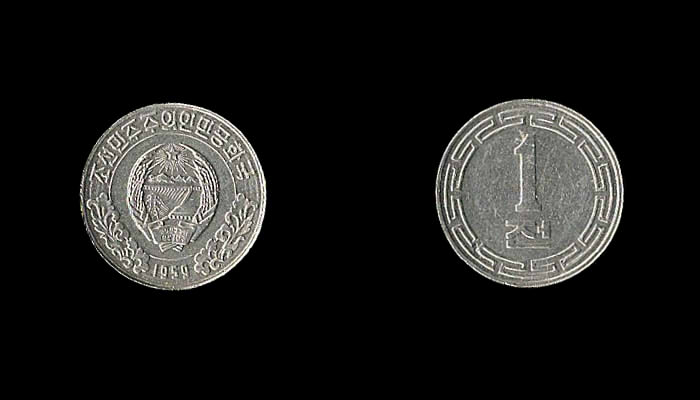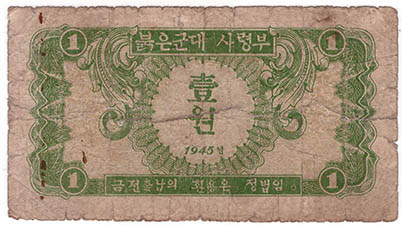|
Korean Won (other)
Korean won primarily refers to: * South Korean won, the present currency of South Korea * North Korean won, the present currency of North Korea It can also refer to these historical currencies: * Korean Empire won, 1900–1910 currency in the Korean Empire * Won of the Red Army Command, 1945–1947 currency in northern Korea under the Soviet Civil Administration * South Korean won (1945–1953) * South Korean hwan, 1953–1962 currency {{DAB ... [...More Info...] [...Related Items...] OR: [Wikipedia] [Google] [Baidu] |
South Korean Won
The South Korean won (symbol: ₩; code: KRW; ) is the official currency of South Korea. A single won is divided into 100 jeon, the monetary subunit. The jeon is no longer used for everyday transactions, and it appears only in foreign exchange rates. The currency is issued by the Bank of Korea, based in the capital city of Seoul. Etymology The old "won" was a cognate of the Chinese yuan, which was derived from the Spanish-American silver dollar. It is derived from the hanja (, ), meaning "round", which describes the shape of the silver dollar. The won was subdivided into 100 (), itself a cognate of the East Asian unit of weight mace and synonymous with money in general. The current won (1962 to present) is written in hangul only and does not officially have any hanja associated with it. First South Korean won History The Korean won, Chinese yuan and Japanese yen were all derived from the Spanish-American silver dollar, a coin widely used for international trade bet ... [...More Info...] [...Related Items...] OR: [Wikipedia] [Google] [Baidu] |
North Korean Won
The Korean People's won, more commonly known as the North Korean won (currency symbol, symbol: ₩; ISO 4217, code: KPW; ) and sometimes known as the Democratic People's Republic of Korea won (), is the official currency of North Korea. It is subdivided into 100 ''chon''. The currency is issued by the Central Bank of the Democratic People's Republic of Korea, based in the North Korean capital city of Pyongyang. Etymology ''Won'', like Japanese yen, is borrowed from Chinese yuan, written Hanja (), which means "round shape". The won is subdivided into 100 chon (). History 1947–2009 After the division of Korea, North Korea continued using the Korean yen for two years, until the Central Bank of the Democratic People's Republic of Korea was established on 6 December 1947 and the first North Korean won was issued. In February 1959, the second North Korean won was introduced, equal to 100 old won. From 1978 on, the Government of North Korea, North Korean government ma ... [...More Info...] [...Related Items...] OR: [Wikipedia] [Google] [Baidu] |
Korean Empire Won
The Korean won ( , ) or Korean Empire won (), was the official currency of the Korean Empire between 1900 and 1910. It was subdivided into 100 ''jeon'' ( ; , ). Etymology Won is a cognate of the Yuan (currency), Chinese yuan and Japanese yen, which were both derived from the Spanish dollar, Spanish-American silver dollar. It is derived from the hanja (, ''won''), meaning "round", which describes the shape of the silver dollar. History The Korean won, Chinese yuan and Japanese yen were all derived from the Spanish dollar, Spanish-American silver dollar, a coin widely used for international trade between Asia and the Americas from the 16th to 19th centuries. On May 22, 1901 the Korean Empire adopted the gold standard in response to many other countries doing the same. The won was introduced in 1902, replacing the Korean yang, yang at a rate of 1 won = 10 yang. Units: 1 won = 100 jeon (錢), 1 jeon = 5 bun (分, "fun" ec. yesteryear spellings) of the preceding curren ... [...More Info...] [...Related Items...] OR: [Wikipedia] [Google] [Baidu] |
Won Of The Red Army Command
Won of the Red Army Command (; ) were banknotes issued by the Soviet Civil Administration, Soviet military command in North Korea and circulated from 1945 to 1947 in parallel with the Korean yen, and then with the North Korean won, DPRK won. History After liberation from Japanese forces, Division of Korea, Korea was divided into two zones under the control of the American and Soviet military commanders. The zone dividing line ran along the 38th parallel. In circulation in both zones, the Korean yen continued to be used, the issue of which was made by the Bank of Joseon, located in the American zone of occupation, which did not give the Soviet military command the opportunity to use the issue of the bank to cover the costs of maintaining troops. In October 1945, 1, 5, 10 and 100 won banknotes were issued on behalf of the Red Army Command. The banknotes bear the date "1945" and the text is in Korean. The issue of banknotes was mainly limited to the locations of Soviet military uni ... [...More Info...] [...Related Items...] OR: [Wikipedia] [Google] [Baidu] |
South Korean Won (1945–1953)
The South Korean won (symbol: ₩; code: KRW; ) is the official currency of South Korea. A single won is divided into 100 jeon, the monetary subunit. The jeon is no longer used for everyday transactions, and it appears only in foreign exchange rates. The currency is issued by the Bank of Korea, based in the capital city of Seoul. Etymology The old "won" was a cognate of the Chinese yuan, which was derived from the Spanish-American silver dollar. It is derived from the hanja (, ), meaning "round", which describes the shape of the silver dollar. The won was subdivided into 100 (), itself a cognate of the East Asian unit of weight mace and synonymous with money in general. The current won (1962 to present) is written in hangul only and does not officially have any hanja associated with it. First South Korean won History The Korean won, Chinese yuan and Japanese yen were all derived from the Spanish-American silver dollar, a coin widely used for international trade bet ... [...More Info...] [...Related Items...] OR: [Wikipedia] [Google] [Baidu] |




